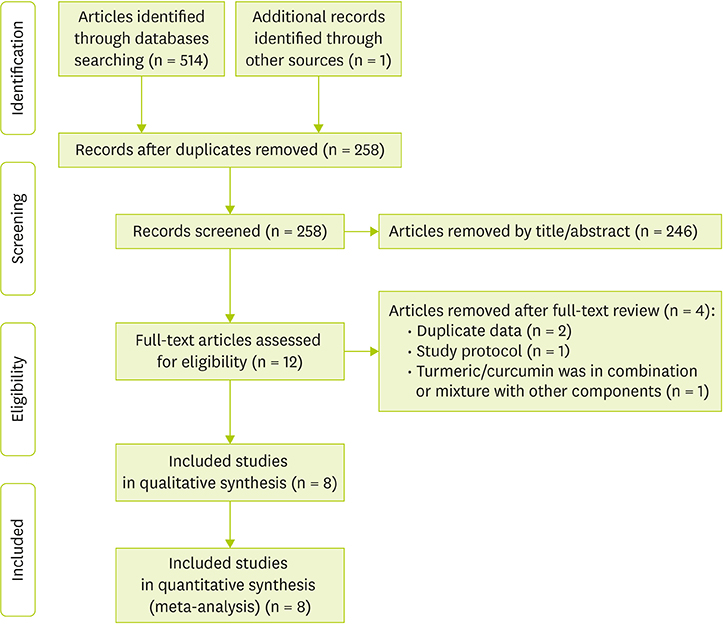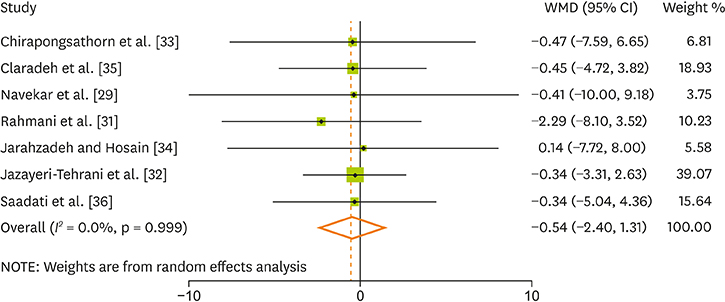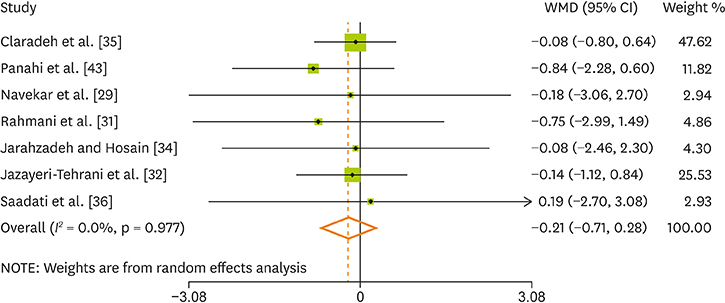Clin Nutr Res.
2019 Jul;8(3):196-208. 10.7762/cnr.2019.8.3.196.
Does Turmeric/curcumin Supplementation Change Anthropometric Indices in Patients with Non-alcoholic Fatty Liver Disease? A Systematic Review and Meta-analysis of Randomized Controlled Trials
- Affiliations
-
- 1Nutrition and Metabolic Diseases Research Center, Ahvaz Jundishapur University of Medical Sciences, Ahvaz 61357-15794, Iran.
- 2Nutrition Department, Paramedical School, Ahvaz Jundishapur University of Medical Sciences, Ahvaz 61357-15794, Iran.
- 3Department of Pharmacology and Toxicology, Lorestan University of Medical Sciences, Khorramabad 68138-33946, Iran.
- 4Chemical Injuries Research Center, Baqiyatallah University of Medical Sciences, Tehran 14359-16471, Iran.
- 5Halal Research Center of IRI, FDA, Tehran, Iran.
- 6Nutrition and Metabolic Disease Research Center, Ahvaz Jundishapur University of Medical Sciences, Ahvaz 61357-15794, Iran. Goodarzi121@yahoo.com
- KMID: 2454077
- DOI: http://doi.org/10.7762/cnr.2019.8.3.196
Abstract
- Curcumin is the principal polylphenol of turmeric that has been used to treat various disorders. However, its anti-obesity effects in patients with non-alcoholic fatty liver disease (NAFLD) remain controversial. Therefore, we aimed to perform a meta-analysis on the effects of supplementation with turmeric/curcumin on body weight, body mass index (BMI) and waist circumference (WC) in these patients. PubMed, Scopus, Cochrane Library, and ISI Web of Science were searched until January 2019, without any restrictions. Clinical trials that reported body weight, BMI and WC in patients with NAFLD were included. Weighted mean differences (WMDs) were pooled using a random-effects model. Eight studies (449 participants) fulfilled the eligibility criteria of the present meta-analysis. Overall, meta-analysis could not show any beneficial effect of turmeric/curcumin supplementation on body weight (WMD, −0.54 kg; 95% confidence interval [CI], −2.40, 1.31; p = 0.56; I² = 0.0%), BMI (WMD, −0.21 kg/m²; 95% CI, −0.71, 0.28; p = 0.39; I² = 0.0%) and WC (WMD, −0.88 cm; 95% CI, −3.76, 2.00; p = 0.54; I² = 0.0%). Subgroup analysis based on participants' baseline BMI, type of intervention, and study duration did not show any significant association in all subgroups. The results showed that turmeric/curcumin supplementation had no signiï¬cant effect on body weight, BMI and WC in patients with NAFLD. Further studies with large-scale are needed to find out possible anti-obesity effects of turmeric/curcumin.
Keyword
MeSH Terms
Figure
Reference
-
1. Goodarzi R, Sabzian K, Shishehbor F, Mansoori A. Does turmeric/curcumin supplementation improve serum alanine aminotransferase and aspartate aminotransferase levels in patients with nonalcoholic fatty liver disease? A systematic review and meta-analysis of randomized controlled trials. Phytother Res. 2019; 33:561–570.
Article2. Loomba R, Sanyal AJ. The global NAFLD epidemic. Nat Rev Gastroenterol Hepatol. 2013; 10:686–690.
Article3. Mansour‐Ghanaei F, Hadi A, Pourmasoumi M, Joukar F, Golpour S, Najafgholizadeh A. Green tea as a safe alternative approach for nonalcoholic fatty liver treatment: a systematic review and meta-analysis of clinical trials. Phytother Res. 2018; 32:1876–1884.
Article4. Marchesini G, Bugianesi E, Forlani G, Cerrelli F, Lenzi M, Manini R, Natale S, Vanni E, Villanova N, Melchionda N, Rizzetto M. Nonalcoholic fatty liver, steatohepatitis, and the metabolic syndrome. Hepatology. 2003; 37:917–923.
Article5. Rinella ME. Nonalcoholic fatty liver disease: a systematic review. JAMA. 2015; 313:2263–2273.6. Targher G, Day CP, Bonora E. Risk of cardiovascular disease in patients with nonalcoholic fatty liver disease. N Engl J Med. 2010; 363:1341–1350.
Article7. Nobili V, Alkhouri N, Alisi A, Della Corte C, Fitzpatrick E, Raponi M, Dhawan A. Nonalcoholic fatty liver disease: a challenge for pediatricians. JAMA Pediatr. 2015; 169:170–176.8. Bellentani S. The epidemiology of non-alcoholic fatty liver disease. Liver Int. 2017; 37:Suppl 1. 81–84.
Article9. Vilar-Gomez E, Martinez-Perez Y, Calzadilla-Bertot L, Torres-Gonzalez A, Gra-Oramas B, Gonzalez-Fabian L, Friedman SL, Diago M, Romero-Gomez M. Weight loss through lifestyle modification significantly reduces features of nonalcoholic steatohepatitis. Gastroenterology. 2015; 149:367–378.e5.
Article10. Chin SH, Kahathuduwa CN, Binks M. Physical activity and obesity: what we know and what we need to know. Obes Rev. 2016; 17:1226–1244.
Article11. Bray GA, Frühbeck G, Ryan DH, Wilding JP. Management of obesity. Lancet. 2016; 387:1947–1956.
Article12. Namazi N, Larijani B, Ayati MH, Abdollahi M. The effects of Nigella sativa L. on obesity: a systematic review and meta-analysis. J Ethnopharmacol. 2018; 219:173–181.
Article13. Jafarnejad S, Tsang C, Taghizadeh M, Asemi Z, Keshavarz SA. A meta-analysis of cumin (Cuminum cyminim L.) consumption on metabolic and anthropometric indices in overweight and type 2 diabetics. J Funct Foods. 2018; 44:313–321.
Article14. Mousavi SM, Rahmani J, Kord-Varkaneh H, Sheikhi A, Larijani B, Esmaillzadeh A. Cinnamon supplementation positively affects obesity: a systematic review and dose-response meta-analysis of randomized controlled trials. Clin Nutr. 2019.
Article15. Pourmasoumi M, Hadi A, Najafgholizadeh A, Joukar F, Mansour-Ghanaei F. The effects of cranberry on cardiovascular metabolic risk factors: a systematic review and meta-analysis. Clin Nutr. 2019.
Article16. Pourmasoumi M, Hadi A, Najafgholizadeh A, Kafeshani M, Sahebkar A. Clinical evidence on the effects of saffron (Crocus sativus L.) on cardiovascular risk factors: a systematic review meta-analysis. Pharmacol Res. 2019; 139:348–359.
Article17. Bahmani M, Eftekhari Z, Saki K, Fazeli-Moghadam E, Jelodari M, Rafieian-Kopaei M. Obesity phytotherapy: review of native herbs used in traditional medicine for obesity. J Evid Based Complementary Altern Med. 2016; 21:228–234.18. Liu Y, Sun M, Yao H, Liu Y, Gao R.. Herbal medicine for the treatment of obesity: an overview of scientific evidence from 2007 to 2017. Evid Based Complement Alternat Med. 2017; 2017:8943059.
Article19. Mansour-Ghanaei F, Pourmasoumi M, Hadi A, Joukar F. Efficacy of curcumin/turmeric on liver enzymes in patients with non-alcoholic fatty liver disease: a systematic review of randomized controlled trials. Integr Med Res. 2018. 8:p. 57–61.
Article20. Chattopadhyay I, Biswas K, Bandyopadhyay U, Banerjee RK. Turmeric and curcumin: Biological actions and medicinal applications. Curr Sci. 2004; 87:44–53.21. Gupta SC, Kismali G, Aggarwal BB. Curcumin, a component of turmeric: from farm to pharmacy. Biofactors. 2013; 39:2–13.
Article22. Sahebkar A, Serban MC, Ursoniu S, Banach M. Effect of curcuminoids on oxidative stress: a systematic review and meta-analysis of randomized controlled trials. J Funct Foods. 2015; 18:898–909.
Article23. Mohammed NA, Habil NY. Evaluation of antimicrobial activity of curcumin against two oral bacteria. Autom Control Intell Syst. 2015; 3:18–21.
Article24. Derosa G, Maffioli P, Simental-Mendía LE, Bo S, Sahebkar A. Effect of curcumin on circulating interleukin-6 concentrations: A systematic review and meta-analysis of randomized controlled trials. Pharmacol Res. 2016; 111:394–404.
Article25. Daily JW, Yang M, Park S. Efficacy of turmeric extracts and curcumin for alleviating the symptoms of joint arthritis: a systematic review and meta-analysis of randomized clinical trials. J Med Food. 2016; 19:717–729.
Article26. Hewlings SJ, Kalman DS. Curcumin: a review of its' effects on human health. Foods. 2017; 6:E92.
Article27. Zhao Y, Chen B, Shen J, Wan L, Zhu Y, Yi T, Xiao Z. The beneficial effects of quercetin, curcumin, and resveratrol in obesity. Oxid Med Cell Longev. 2017; 2017:1459497.
Article28. Mantzorou M, Pavlidou E, Vasios G, Tsagalioti E, Giaginis C. Effects of curcumin consumption on human chronic diseases: a narrative review of the most recent clinical data. Phytother Res. 2018; 32:957–975.
Article29. Navekar R, Rafraf M, Ghaffari A, Asghari-Jafarabadi M, Khoshbaten M. Turmeric supplementation improves serum glucose indices and leptin levels in patients with nonalcoholic fatty liver diseases. J Am Coll Nutr. 2017; 36:261–267.
Article30. Panahi Y, Kianpour P, Mohtashami R, Jafari R, Simental-Mendía LE, Sahebkar A. Efficacy and safety of phytosomal curcumin in non-alcoholic fatty liver disease: a randomized controlled trial. Drug Res (Stuttg). 2017; 67:244–251.
Article31. Rahmani S, Asgary S, Askari G, Keshvari M, Hatamipour M, Feizi A, Sahebkar A. Treatment of non‐alcoholic fatty liver disease with curcumin: a randomized placebo‐controlled trial. Phytother Res. 2016; 30:1540–1548.
Article32. Jazayeri-Tehrani SA, Rezayat SM, Mansouri S, Qorbani M, Alavian SM, Daneshi-Maskooni M, Hosseinzadeh-Attar MJ. The nanocurcumin reduces appetite in obese patients with non-alcoholic fatty liver disease (NAFLD): a double-blind randomized placebo-controlled clinical trial. Nanomed J. 2018; 5:67–76.33. Chirapongsathorn S, Jearjesdakul J, Sanpajit T, Juthaputthi A. Curcumin trend to improve alanine transaminase (Alt) in non-alcoholic fatty liver disease (NAFLD) with abnormal ALT: p11–90. J Gastroenterol Hepatol. 2012; 27:231–232.34. Jarahzadeh M, Hosain D. The effect of Turmeric on lipid profile, malondialdehyde, liver echogenicity and enzymes in patients with non-alcoholic fatty liver. cited 2015 Oct 25. Available from http://enirctir/trial/20521.35. Claradeh BM, Azarbaijani MA, Piri M, Homaie HM. Effect of curcumin supplementation and resistance training in patients with nonalcoholic fatty liver disease. J Med Plants. 2016; 4:161–172.36. Saadati S, Hatami B, Yari Z, Shahrbaf MA, Eghtesad S, Mansour A, Poustchi H, Hedayati M, Aghajanpoor-Pasha M, Sadeghi A, Hekmatdoost A. The effects of curcumin supplementation on liver enzymes, lipid profile, glucose homeostasis, and hepatic steatosis and fibrosis in patients with non-alcoholic fatty liver disease. Eur J Clin Nutr. 2019; 73:441–449.
Article37. Moher D, Liberati A, Tetzlaff J, Altman DG; PRISMA Group. Preferred reporting items for systematic reviews and meta-analyses: the PRISMA statement. Ann Intern Med. 2009; 151:264–269.
Article38. Higgins JP, Altman DG, Gøtzsche PC, Jüni P, Moher D, Oxman AD, Savović J, Schulz KF, Weeks L, Sterne JA; Cochrane Bias Methods Group; Cochrane Statistical Methods Group. The Cochrane Collaboration's tool for assessing risk of bias in randomised trials. BMJ. 2011; 343:d5928.
Article39. DerSimonian R, Laird N. Meta-analysis in clinical trials. Control Clin Trials. 1986; 7:177–188.
Article40. Green S, Higgins JP. Cochrane handbook for systematic reviews of interventions. Chichester: Wiley-Blackwell;2005.41. Schroll JB, Moustgaard R, Gøtzsche PC. Dealing with substantial heterogeneity in Cochrane reviews. Cross-sectional study. BMC Med Res Methodol. 2011; 11:22.
Article42. Egger M, Davey Smith G, Schneider M, Minder C. Bias in meta-analysis detected by a simple, graphical test. BMJ. 1997; 315:629–634.
Article43. Panahi Y, Kianpour P, Mohtashami R, Jafari R, Simental-Mendía LE, Sahebkar A. Curcumin lowers serum lipids and uric acid in subjects with nonalcoholic fatty liver disease: a randomized controlled trial. J Cardiovasc Pharmacol. 2016; 68:223–229.
Article44. Ghaffari A, Rafraf M, Navekar R, Asghari-Jafarabadi M. Effects of turmeric and chicory seed supplementation on antioxidant and inflammatory biomarkers in patients with non-alcoholic fatty liver disease (NAFLD). Adv Integr Med. 2018; 5:89–95.
Article45. Chashmniam S, Mirhafez SR, Dehabeh M, Hariri M, Azimi Nezhad M, Nobakht M Gh BF. A pilot study of the effect of phospholipid curcumin on serum metabolomic profile in patients with non-alcoholic fatty liver disease: a randomized, double-blind, placebo-controlled trial. Eur J Clin Nutr. 2019.
Article46. Jazayeri-Tehrani SA, Rezayat SM, Mansouri S, Qorbani M, Alavian SM, Daneshi-Maskooni M, Hosseinzadeh-Attar MJ. Efficacy of nanocurcumin supplementation on insulin resistance, lipids, inflammatory factors and nesfatin among obese patients with non-alcoholic fatty liver disease (NAFLD): a trial protocol. BMJ Open. 2017; 7:e016914.
Article47. Mousavi SM, Milajerdi A, Varkaneh HK, Gorjipour MM, Esmaillzadeh A. The effects of curcumin supplementation on body weight, body mass index and waist circumference: a systematic review and dose-response meta-analysis of randomized controlled trials. Crit Rev Food Sci Nutr. 2018; 1–10.
Article48. Wei Z, Liu N, Tantai X, Xing X, Xiao C, Chen L, Wang J. The effects of curcumin on the metabolic parameters of non-alcoholic fatty liver disease: a meta-analysis of randomized controlled trials. Hepatol Int. 2018.
Article49. Kim CY, Le TT, Chen C, Cheng JX, Kim KH. Curcumin inhibits adipocyte differentiation through modulation of mitotic clonal expansion. J Nutr Biochem. 2011; 22:910–920.
Article50. Alappat L, Awad AB. Curcumin and obesity: evidence and mechanisms. Nutr Rev. 2010; 68:729–738.
Article51. Ejaz A, Wu D, Kwan P, Meydani M. Curcumin inhibits adipogenesis in 3T3-L1 adipocytes and angiogenesis and obesity in C57/BL mice. J Nutr. 2009; 139:919–925.
Article52. Pu Y, Zhang H, Wang P, Zhao Y, Li Q, Wei X, Cui Y, Sun J, Shang Q, Liu D, Zhu Z. Dietary curcumin ameliorates aging-related cerebrovascular dysfunction through the AMPK/uncoupling protein 2 pathway. Cell Physiol Biochem. 2013; 32:1167–1177.
Article53. Bradford PG. Curcumin and obesity. Biofactors. 2013; 39:78–87.
Article54. Atkin SL, Katsiki N, Derosa G, Maffioli P, Sahebkar A. Curcuminoids lower plasma leptin concentrations: a meta‐analysis. Phytother Res. 2017; 31:1836–1841.
Article55. Yamauchi T, Kamon J, Minokoshi Y, Ito Y, Waki H, Uchida S, Yamashita S, Noda M, Kita S, Ueki K, Eto K, Akanuma Y, Froguel P, Foufelle F, Ferre P, Carling D, Kimura S, Nagai R, Kahn BB, Kadowaki T. Adiponectin stimulates glucose utilization and fatty-acid oxidation by activating AMP-activated protein kinase. Nat Med. 2002; 8:1288–1295.
Article56. Weinstein SE, Shide DJ, Rolls BJ. Changes in food intake in response to stress in men and women: psychological factors. Appetite. 1997; 28:7–18.
Article57. Herman CP, Polivy J, Lank CN, Heatherton TF. Anxiety, hunger, and eating behavior. J Abnorm Psychol. 1987; 96:264–269.
Article58. Chimakurthy J, Talasila M. Effects of curcumin on pentylenetetrazole-induced anxiety-like behaviors and associated changes in cognition and monoamine levels. Psychol Neurosci. 2010; 3:239–244.
Article59. Esmaily H, Sahebkar A, Iranshahi M, Ganjali S, Mohammadi A, Ferns G, Ghayour-Mobarhan M. An investigation of the effects of curcumin on anxiety and depression in obese individuals: a randomized controlled trial. Chin J Integr Med. 2015; 21:332–338.
Article60. Lopresti AL, Drummond PD. Efficacy of curcumin, and a saffron/curcumin combination for the treatment of major depression: a randomised, double-blind, placebo-controlled study. J Affect Disord. 2017; 207:188–196.
Article
- Full Text Links
- Actions
-
Cited
- CITED
-
- Close
- Share
- Similar articles
-
- The independent effect of exercise on biopsy-proven non-alcoholic fatty liver disease: A systematic review
- The Effect of Omega-3 Supplementation on Heart Failure Outcome: A Meta-Analysis of Randomized Clinical Trial
- Correspondence to editorial on “Optimal cut-offs of vibration-controlled transient elastography and magnetic resonance elastography in diagnosing advanced liver fibrosis in patients with nonalcoholic fatty liver disease: a systematic review and meta-analysis”
- Correspondence to editorial on “Optimal cutoffs of vibration-controlled transient elastography and magnetic resonance elastography in diagnosing advanced liver fibrosis in patients with nonalcoholic fatty liver disease: A systematic review and meta-analysis”
- Vitamin D and Risk of Respiratory Tract Infections in Children: A Systematic Review and Meta-analysis of Randomized Controlled Trials






